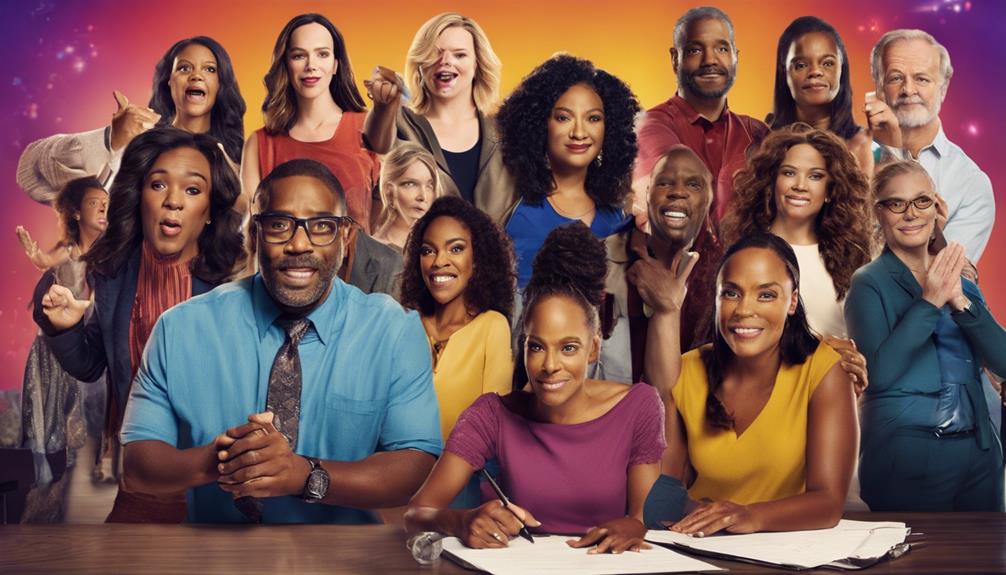In the realm of dating, it is crucial to grasp the intricacies of communication for deaf individuals.
Picture this: you're on a date with someone who is deaf; what do you do next?
By exploring the do's and don'ts tailored to their unique needs, we can enhance our connections and foster meaningful relationships.
Let's uncover the intricacies of dating etiquette in the deaf community to ensure inclusivity and respect in our romantic pursuits.
Key Takeaways
- Respect diverse communication methods beyond verbal speech.
- Choose a partner willing to understand and adapt.
- Embrace Deaf culture for deeper connections.
- Patience and mutual understanding are crucial for thriving relationships.
Clear Communication Is Key
Clear communication plays a pivotal role in establishing meaningful connections with deaf individuals. When engaging in conversations with deaf individuals, it's crucial to be direct and straightforward to avoid misunderstandings.
Using visual aids or written communication can greatly enhance understanding and ensure that the message is effectively conveyed. Patience and active listening are key components of effective communication, allowing for a deeper connection to be formed.
Understanding and embracing different communication styles can also foster stronger relationships by accommodating individual preferences. By being mindful of these factors and adapting our communication methods, we can create a more inclusive and supportive environment for deaf individuals.
Building strong relationships with deaf individuals starts with clear and thoughtful communication that considers their unique needs and preferences.
Embrace Closed Captions

Embracing closed captions enhances the viewing experience for deaf individuals, providing crucial visual context for dialogue and sounds in media content. Closed captions play a vital role in ensuring accessibility and inclusivity for the deaf community. Here's why embracing closed captions is essential:
- Enhanced Comprehension: Closed captions allow deaf individuals to follow the storyline, dialogue, and sound effects in movies and TV shows, leading to a more comprehensive understanding of the content.
- Improved Social Settings: In social gatherings where audio information is shared, closed captions become indispensable for deaf individuals to fully engage and participate in conversations or group activities.
- Promotion of Inclusivity: Utilizing closed captions not only benefits deaf individuals but also promotes inclusivity and equal access to entertainment, fostering a more inclusive society where everyone can enjoy media content together seamlessly.
Respect Seating Preferences
When considering seating preferences for deaf individuals, it's crucial to prioritize their communication needs.
By facing each other and choosing appropriate settings, we can create equal opportunities for smooth interaction.
Respecting individual preferences ensures a comfortable and inclusive dating experience.
Seating Communication Needs
For deaf individuals seeking effective communication, the choice of seating can significantly impact the clarity of interactions and understanding. Optimal seating arrangements play a crucial role in facilitating visual communication. Here are key considerations for seating communication needs:
- Face Each Other: Optimal seating involves facing each other for clear communication.
- Well-Lit Areas: Choose well-lit spaces to aid lip-reading and enhance visual communication.
- Avoid Noise and Back-Lit Areas: Steer clear of noisy environments or back-lit seating that can hinder communication.
Respecting the seating preferences of deaf individuals is essential for creating a conducive environment that fosters effective communication.
Equal Seating Opportunities
In considering seating arrangements for deaf individuals, prioritizing their preferences is crucial for fostering effective communication and ensuring equal opportunities for engagement. Respecting seating preferences not only shows consideration but also enhances communication by providing comfort and visibility.
Opt for seating that allows for clear views of facial expressions and gestures, facilitating better understanding and connection. Avoid locations with poor lighting or excessive noise that could hinder communication.
Consider Individual Preferences
Understanding and acknowledging the specific seating preferences of deaf individuals can significantly enhance their comfort and communication experience during dates. When considering seating arrangements, it's essential to prioritize optimal communication by respecting the individual's preferences. Here are key points to keep in mind:
- Seating Preferences: Deaf individuals may prefer seating that allows for better visibility and lighting, aiding in lip-reading and visual communication.
- Communication Needs: Respecting their seating choices shows consideration for their communication needs and fosters a more inclusive environment.
- Comfort Matters: By prioritizing their comfort through appropriate seating arrangements, you create a welcoming space for meaningful interactions.
Practice Patience and Understanding

Navigating communication challenges effectively when dating a deaf individual requires practicing patience and understanding. Deaf culture encompasses unique communication methods that may differ from mainstream practices. By taking the time to understand these differences, we show respect and empathy towards our deaf partner. Building trust through patient interactions fosters a deeper connection and mutual understanding. It is crucial to create an inclusive environment where both partners feel supported and valued.
| Importance of Patience and Understanding |
|---|
| Demonstrates respect and empathy towards deaf culture |
| Builds trust and strengthens the relationship |
| Creates a supportive and inclusive dating experience |
Embracing patience and understanding in communication not only enriches the relationship but also contributes to personal growth. It allows us to learn from each other's experiences and perspectives, leading to a more profound connection. By being patient and open-minded, we can forge a strong and lasting bond based on mutual respect and understanding.
Ensure Comfort During Intimacy

When it comes to intimacy with a deaf partner, it's crucial to approach communication and boundaries with care.
We must openly discuss preferences around hearing devices and establish signals for effective interaction.
Respecting each other's comfort and needs ensures a safe and respectful environment for intimate moments.
Communication During Intimacy
Establishing clear signals for communication in intimate moments is essential to ensure understanding and comfort for both partners. When it comes to communication during intimacy with deaf individuals, it's crucial to consider their preferences and needs. Here are some key points to keep in mind:
- Respect Hearing Devices: Always respect the deaf individual's preferences regarding their hearing devices during intimate encounters.
- Open Communication: Be open about any adjustments or accommodations needed for optimal communication during intimacy.
- Safe Environment: Create a safe and supportive environment that promotes effective communication and mutual understanding during intimate interactions.
Establishing Trust and Boundaries
As we focus on ensuring comfort during intimate moments, it's crucial to establish trust and boundaries to promote a secure and respectful environment for both partners. Clear communication about intimacy preferences and boundaries is key to fostering a harmonious relationship. Agreeing on signals or methods for communication during intimate moments, especially in low-light settings, can help ensure both partners feel understood and respected.
It's essential to respect the deaf individual's preferences regarding their hearing devices during intimate interactions. Avoid touching or interfering with hearing devices without permission, as this can disrupt the individual's comfort and trust. Prioritize open communication and understanding to create a safe and comfortable space for intimate interactions where both partners feel valued and secure.
Be Willing to Repeat Yourself

Understanding the importance of repetition in communication with deaf individuals is crucial for fostering clear and respectful interactions. When dating someone who's deaf, being willing to repeat yourself demonstrates patience, respect, and consideration for their unique communication needs. Here are three key points to keep in mind:
- Clear Communication: Repetition helps ensure that the message is understood clearly by the deaf individual. It allows them to grasp the information being conveyed without any ambiguity.
- Respect and Consideration: Being open to repeating yourself shows respect for the deaf person's communication style and the challenges they may face. It demonstrates that you value effective communication in the relationship.
- Building Trust: Repetition may be necessary in various settings, from social gatherings to intimate moments. By being willing to repeat information, you show that you're committed to ensuring mutual understanding and building trust in the relationship.
Ask Questions for Clarity

As we navigate through the realm of dating as deaf individuals, asking questions for clarity becomes essential in building strong connections. By seeking clarification on communication preferences, we show respect and understanding, fostering a deeper bond.
Using visual aids can further enhance our interactions and create a more inclusive and engaging environment for all involved.
Clarify Communication Preferences
Regularly checking in about preferred communication methods like sign language or lip-reading is essential for effective communication when dating a deaf individual. Understanding and respecting their communication preferences can lead to a more fulfilling relationship. Here are three key points to consider:
- Respect: Asking about preferred methods shows respect for their unique communication needs.
- Understanding: Clear communication fosters understanding and strengthens the bond between partners.
- Consideration: Being open to learning about different communication styles demonstrates consideration and a willingness to connect on a deeper level.
Respect Privacy Boundaries
When navigating a relationship with a deaf individual, it's crucial to ask for permission before touching or adjusting any hearing devices to respect their privacy boundaries. Understanding and respecting their personal space is paramount in building trust and comfort.
By inquiring about preferred communication methods, you not only show respect but also ensure clear and effective interaction. Misunderstandings can easily arise if boundaries aren't respected, so seeking clarity through open communication is key.
Use Visual Aids
Utilizing visual aids, such as diagrams or written notes, can significantly enhance communication clarity for both parties involved in a conversation. When dating as a deaf individual, incorporating visual aids can foster a deeper connection and understanding with your partner. Here are some ways visual aids can benefit communication:
- Visual aids provide a visual representation of concepts: This helps in conveying complex information effectively.
- Using gestures or pictures enhances engagement: It encourages active participation and makes conversations more dynamic.
- Asking clarifying questions ensures understanding: It shows your interest in clear communication and promotes a more meaningful interaction.
Consider Accessibility Needs

Considering the accessibility needs of deaf individuals is crucial when planning dates to ensure smooth communication and a comfortable experience. When organizing a date, it's essential to choose well-lit and quiet locations that facilitate lipreading and communication. Opt for venues that provide closed captioning or subtitles for movies or shows to enhance the overall experience. Additionally, consider the use of sign language interpreters to ensure more accessible communication. Seating arrangements should be arranged in a way that allows for clear visibility and optimal communication between individuals. Prioritizing open communication about accessibility needs can help create a comfortable environment for both parties involved. By being mindful of these considerations, you can ensure that your date is inclusive and enjoyable for everyone.
| Accessibility Needs | Tips |
|---|---|
| Choose appropriate venues | Opt for well-lit and quiet locations for better lipreading and communication. |
| Closed captioning | Select venues that offer closed captioning or subtitles for enhanced enjoyment. |
| Sign language interpreters | Consider using interpreters for more accessible communication. |
| Seating arrangements | Arrange seating for clear visibility and optimal communication. |
Learn Basic Sign Language
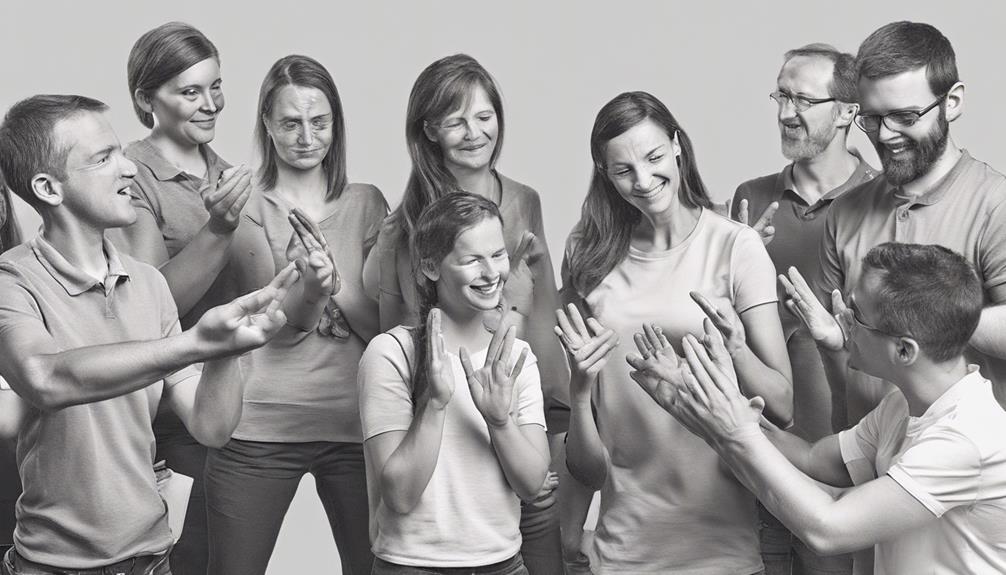
Learning basic sign language enhances communication and fosters deeper connections with deaf individuals. When dating a deaf person, making an effort to learn sign language basics can greatly improve your relationship. Here are three key reasons why incorporating sign language into your interactions is crucial:
- Effective Communication: Sign language provides a direct way to communicate with your deaf partner, ensuring that your messages are accurately conveyed without misunderstandings.
- Expressing Affection: Knowing common signs like 'I love you' allows you to express your feelings and affection in a way that resonates deeply with your partner, strengthening emotional bonds.
- Showing Respect for Deaf Culture: By learning sign language, you demonstrate respect for your partner's culture and identity, fostering a more inclusive and understanding relationship.
Foster Open Communication

To build a strong and lasting relationship, fostering open communication is key. Communication forms the foundation for trust and understanding in any relationship, especially for deaf individuals. By openly discussing needs and challenges, partners can forge a deep connection that transcends any communication barriers. Understanding each other's love languages is crucial, as it allows for more meaningful interactions and helps in meeting each other's emotional needs. Resolving issues through effective communication not only strengthens the bond between partners but also promotes a healthy and thriving relationship. Regular communication is essential for addressing conflicts promptly and maintaining harmony in the relationship.
| Communication | Trust | Understanding | Needs |
|---|---|---|---|
| Vital for bonding | Built over time | Key for empathy | Must be voiced |
This table encapsulates the essence of fostering open communication in a relationship, highlighting its significance in navigating challenges, fostering trust, and meeting each other's needs effectively.
Choose the Right Partner
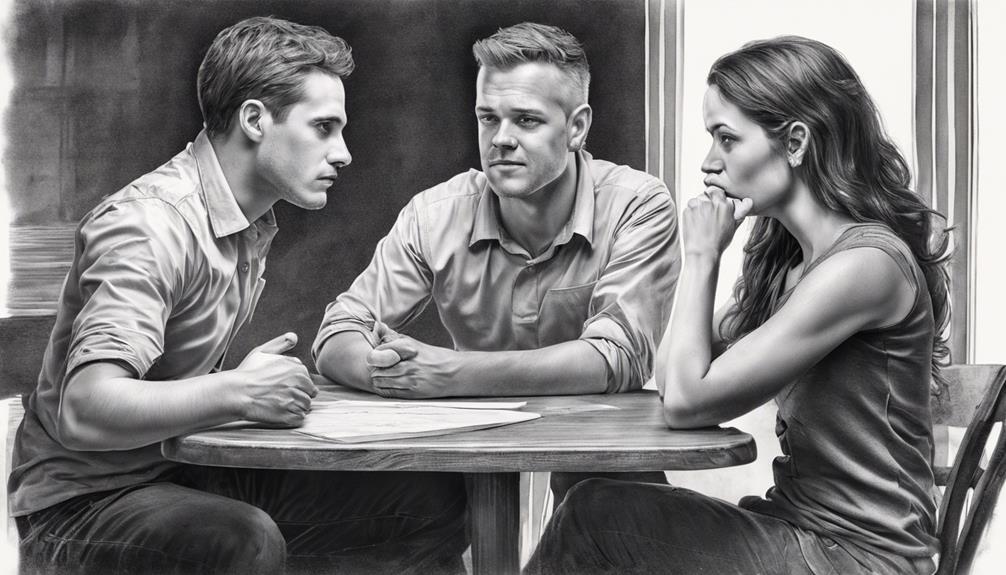
Finding the right partner for a deaf individual involves seeking someone who demonstrates patience, understanding, and a willingness to embrace deaf culture. When diving into the dating world, it's crucial to choose a partner who respects your communication preferences and values clear and open communication in the relationship.
Look for someone who's supportive of your unique communication methods and needs, and who's willing to adapt and make efforts to bridge any communication gaps. This can lead to a more fulfilling and understanding relationship where both partners feel heard and valued.
Building a strong foundation based on mutual respect and openness can help navigate the challenges that may arise due to differences in communication styles. By choosing a supportive partner who's willing to learn and grow together, you can create a relationship that thrives on understanding and connection.
Address Misconceptions About Deafness
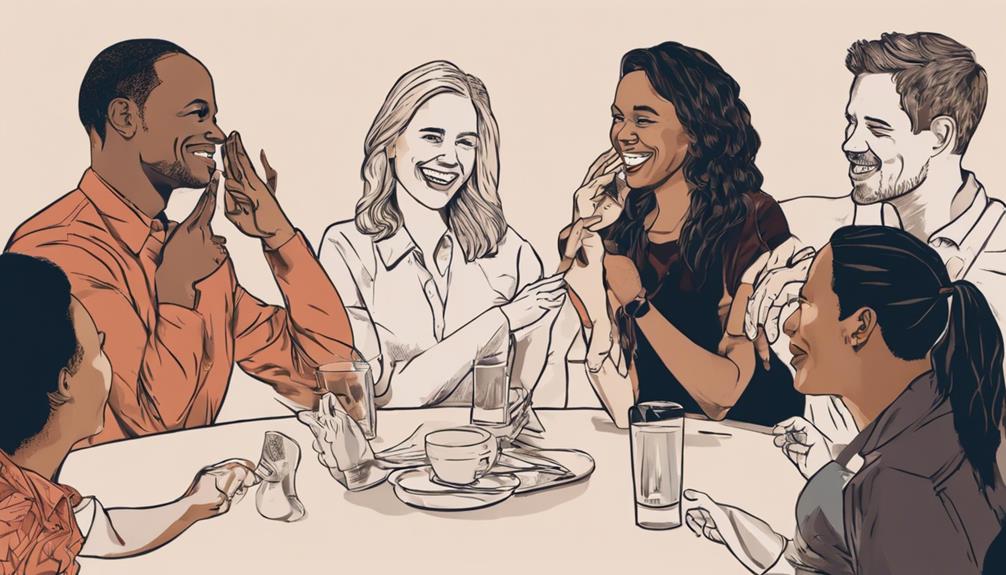
Let's clear up common misconceptions about deafness together.
Understanding that deafness is a spectrum and that not all deaf individuals communicate in the same way is important.
We can work on building awareness and breaking down barriers by acknowledging and respecting different communication preferences.
Common Deaf Myths
Many misconceptions surround deafness, perpetuating stereotypes that can hinder genuine connections with deaf individuals. It's crucial to dispel these myths to foster understanding and inclusive relationships.
Here are three important points to consider:
- Deaf individuals aren't limited in their ability to love or form meaningful relationships.
- Deafness doesn't define a person's worth or capabilities in a romantic relationship.
- Communication barriers can be overcome with patience, understanding, and willingness to adapt.
Communication Strategies
Effective communication with deaf individuals requires understanding and embracing diverse communication methods beyond verbal speech. Deaf individuals often rely on lip-reading, sign language, and visual cues for effective communication. It's crucial to dispel misconceptions that not all deaf individuals can read lips or use sign language. Shouting is also not an effective communication method. Deafness does not equate to an inability to communicate; it's about using different means. Patience, clarity, and understanding of preferred communication methods are essential for effective communication with deaf individuals. Below is a table highlighting key points for effective communication:
| Key Points | Description |
|---|---|
| Lip-reading | Not all deaf individuals can read lips |
| Sign language | Many deaf individuals use sign language as their primary mode |
| Visual cues | Visual cues play a significant role in communication |
| Patience and Clarity | Patience and clear communication are vital |
Deaf Culture Awareness
To better understand and appreciate the rich and diverse Deaf culture, it's crucial to debunk common misconceptions surrounding deafness. Here are three key points to consider when addressing Deaf Culture Awareness:
- Deaf Culture: Deaf culture is a vibrant community with its own language, norms, and traditions, which play a significant role in the lives of Deaf individuals.
- American Sign Language (ASL): ASL is a vital means of communication for many Deaf individuals, serving as a visual-gestural language that fosters connection and understanding within the community.
- Unique Perspective: Deafness isn't a disability but a unique way of experiencing the world. Understanding and embracing this perspective can lead to deeper respect, meaningful interactions, and stronger community connections.
Navigate Social Situations With Confidence

When stepping into social settings as a deaf individual, it's essential to approach interactions with confidence and authenticity. Embracing our uniqueness and navigating social situations with self-assurance can make a significant difference in how we connect with others.
To enhance our dating experiences, attending deaf-friendly events or social gatherings can provide a supportive environment where we can meet like-minded individuals who understand our communication styles. It's crucial to clearly communicate our preferences and needs to establish mutual understanding with potential partners. Being open to learning about different communication styles and adapting to new dating experiences can broaden our horizons and create enriching connections.
Utilizing technology like video calls and messaging can also help us stay connected with others and maintain relationships. By confidently embracing who we're and engaging with others authentically, we can navigate social situations with grace and openness.
Support Each Other's Needs

Understanding and supporting each other's communication needs is fundamental to building a strong and fulfilling relationship. In the journey of dating, especially as a deaf individual, communication plays a pivotal role in fostering a deep connection.
Here are essential ways to support each other's needs:
- Practice Patience: Communication may require more time and effort, so patience is key. Take the time to understand each other's unique communication styles and preferences.
- Show Empathy and Understanding: Be empathetic towards your partner's experiences and challenges in the realm of dating. Understanding their perspective can strengthen your bond.
- Respect Each Other's Boundaries: It's crucial to respect and accommodate your partner's communication methods and comfort levels. Creating a supportive environment where both partners feel understood and respected is vital for a lasting relationship.
Embrace Differences and Celebrate Diversity
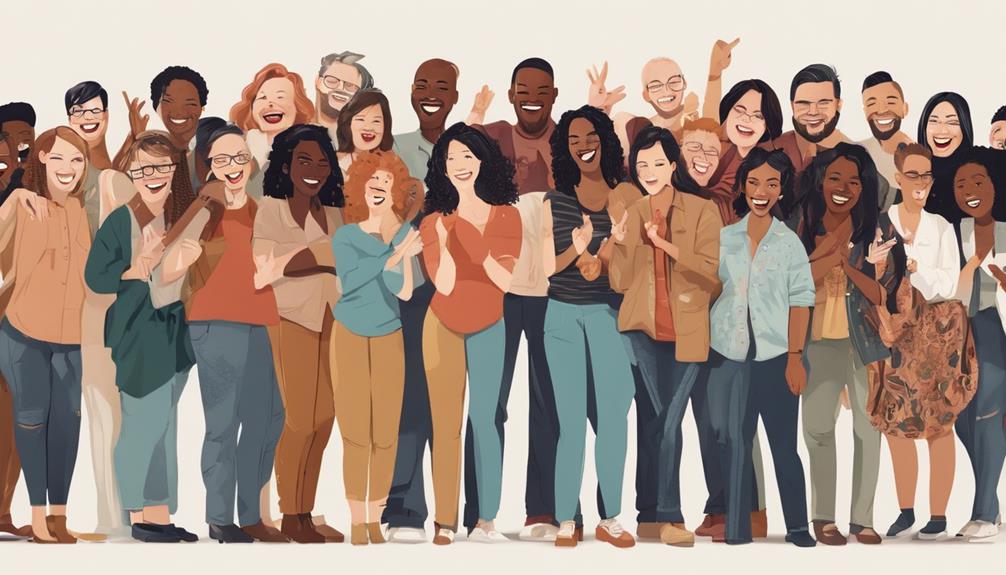
Let's honor and cherish the diverse perspectives and richness that dating a deaf individual brings by embracing differences and celebrating the unique tapestry of experiences within the deaf community. When dating a deaf individual, it is essential to recognize and respect the various communication methods and cultural aspects that contribute to the beauty of Deaf culture. By celebrating diversity, we can foster a deeper connection and appreciation for the unique perspectives that deaf individuals bring to a relationship. It is crucial to respect differences in language and expression, understanding that these variances enrich the interactions we have with our deaf partners. Embracing inclusivity and learning about Deaf culture and traditions not only strengthens the bond in the relationship but also demonstrates a genuine willingness to understand and connect on a deeper level. By valuing and celebrating diversity, we create a more vibrant and fulfilling dating experience for both partners.
| Key Points | Description |
|---|---|
| Celebrate Diversity | Embrace the varied perspectives and experiences within the deaf community. |
| Deaf Culture | Learn about the cultural aspects and traditions that define Deaf culture. |
| Communication Methods | Respect and appreciate the diverse ways in which deaf individuals communicate. |
Frequently Asked Questions
Is Dating a Deaf Person Hard?
Dating a deaf person can pose unique challenges, but it's not inherently hard. Communication may require adjustments, like using visuals or sign language, but understanding and patience are key.
Building trust through open dialogue can strengthen the relationship. With mutual respect and a willingness to learn, dating a deaf individual can be rewarding and fulfilling.
It's about embracing differences and finding creative ways to connect on a deeper level.
How to Date a Deaf Person?
Navigating the complexities of dating a deaf individual requires patience and understanding. Effective communication is key, so facing them directly and utilizing visual cues like subtitles can enhance interactions.
What Are the Do's and Don'ts of Getting a Deaf Person's Attention?
To get a deaf person's attention effectively, it's crucial to use gentle methods like tapping their shoulder or creating visual signals. Avoid sudden movements that can startle them.
Establishing a consistent routine or signal in various settings can help bridge communication gaps. Patience and understanding play key roles in successfully engaging with deaf individuals.
What Is Considered Disrespectful to Deaf People?
Interrupting or talking over a deaf person can be disrespectful. It's crucial to give them our full attention and be patient in communication.
Ignoring their needs or preferences is also impolite. Understanding and respecting their communication style and providing necessary accommodations shows consideration.
It's essential to approach interactions with sensitivity and empathy to foster mutual understanding and respect.
What Are Some Important Dating Do’s and Don’ts for Deaf Individuals in Asian Culture?
When it comes to deaf Asian dating, communication is key. Do’s: Learn basic sign language, be patient, and show respect for their culture. Don’ts: Make assumptions about their abilities, neglect to ask about their preferences, or rely solely on verbal communication. Following these deaf Asian dating tips can lead to a successful relationship.
Conclusion
As we wrap up our journey through dating do's and don'ts for deaf individuals, remember to always keep an open mind and heart. Embrace the uniqueness of communication styles and celebrate the diversity that brings us together.
So, next time you find yourself in the dating world with a deaf individual, remember to listen with your eyes and speak with your heart. Love knows no boundaries, especially when it comes to understanding and empathy.






